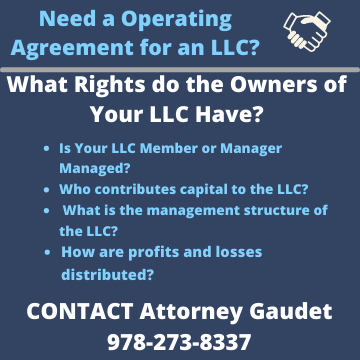
Why spend time and money to obtain an operating agreement for your limited liability company (LLC)?
There are numerous reasons for developing a detailed operating agreement for your Massachusetts based LLC. The first, and I believe most important reason for drafting an operating agreement is that the agreement creates control by defining many of the most critical aspects of the business and business operation. In business, control is a key stabilizing factor of any business and without it, business owners have no practical way of anticipating change thoughtfully. Without control a business is forced to take a more reactionary position to internal and external changes. Below is a persuasive argument for how an operating agreement creates peace of mind by increasing practical control over the business now and in the future.
Define the Management Structure
Use the operating agreement to describe your management structure. You likely started a business to eventually free yourself up to start other businesses, to make time your own, or to explore other passions. The operating agreement is the ideal document to parse out precisely how a manager or executive will receive compensation, to touch on noncompete issues, termination agreements, and to outline what degree of authority the manager or executive will have.
Avoid Default Rules
Absent an operating agreement, in Massachusetts, an LLC must follow Massachusetts statute which dictates how the LLC is structured. While operating a business in the manner the Massachusetts statutes dictate may not cause a problem for one business, doing so may be highly problematic for another. Again, here, it is the lack of control that is problematic. Simply giving up key decisions to default statutory authority is counterintuitive to a businessperson. It is far better to document in an operating agreement exactly what you want for the present and future operation of your LLC.
Anticipate Growth
You have started your Massachusetts LLC presumably to be successful, to grow and grow and grow. You will need money to make growth happen. The question becomes, what happens if, further down the road you want to invite in a future investor? How will that future investor in your LLC be treated? How much control or influence will that investor have over your LLC? Investors looking for a piece of a business will inevitably want some degree of control over that business. By defining the role of the investor now, you will set yourself and your business up to take a strong negotiating position with any investor in the future.
Clearly Establish a Separate, Business Identity
One of the pitfalls of operating an LLC, and this is particularly true for single operator or family operated LLC’s, is that the company can appear to be one and the same with the individual owner. If there are no problems that confront the business, then there are no pitfalls. However, as any successful business owner will admit, there are always problems confronting a business. One of the most damaging issues that can threaten any business is a lawsuit from an employee, a vendor, or other source. When a lawsuit occurs, if is not settled outside of court, attorneys for the opposing party will carefully scrutinize the structure of the LLC. These attorneys will be looking for any weakness in the LLC to exploit. One pitfall, or common weakness of a single member of family owned and operated LLC is that the LLC appears to be one and the same with the people running it. It is not uncommon for owner/operators of an LLC to mix business with personal accounts, moving money freely from one to the other. Sometimes and LLC owner will make purchases on the company account that may not possibly be explained as logical expenses for the business. When the aforementioned actions occur, a court may interpret these actions to indicate that the business is actually operated as a sole proprietorship. And because a sole proprietorship provides no legal protection for the owner of the sole proprietorship, the owner’s personal assets are likely to become the target of a damage award in a lawsuit.
The ability of a court to treat an LLC as a sole proprietorship could largely be avoided simply by having an operating agreement in place for that LLC.
What About a Successor?
When planning ahead for your Massachusetts LLC you will also want the operating agreement to spell out in detail the process of winding down your business. Think of planning in this aspect of the operating agreement as similar to how one plans for one’s own passing. To make the lives of our families and friends easier, it is common for individuals to purchase a plot and prepay funeral arrangements for themselves. Similarly, to make the lives of your heirs easier, it is helpful to plan for how the business would be dissolved, should you no longer be able to operate the business and no able successor were present to continue operations.
DISCLAIMER:
The information provided in the pages and posts of this website are for general informational purposes only. The information presented on this site is not legal advice, and no attorney-client relationship is formed by the use of this site.
To read an updated version of this article, click here.



